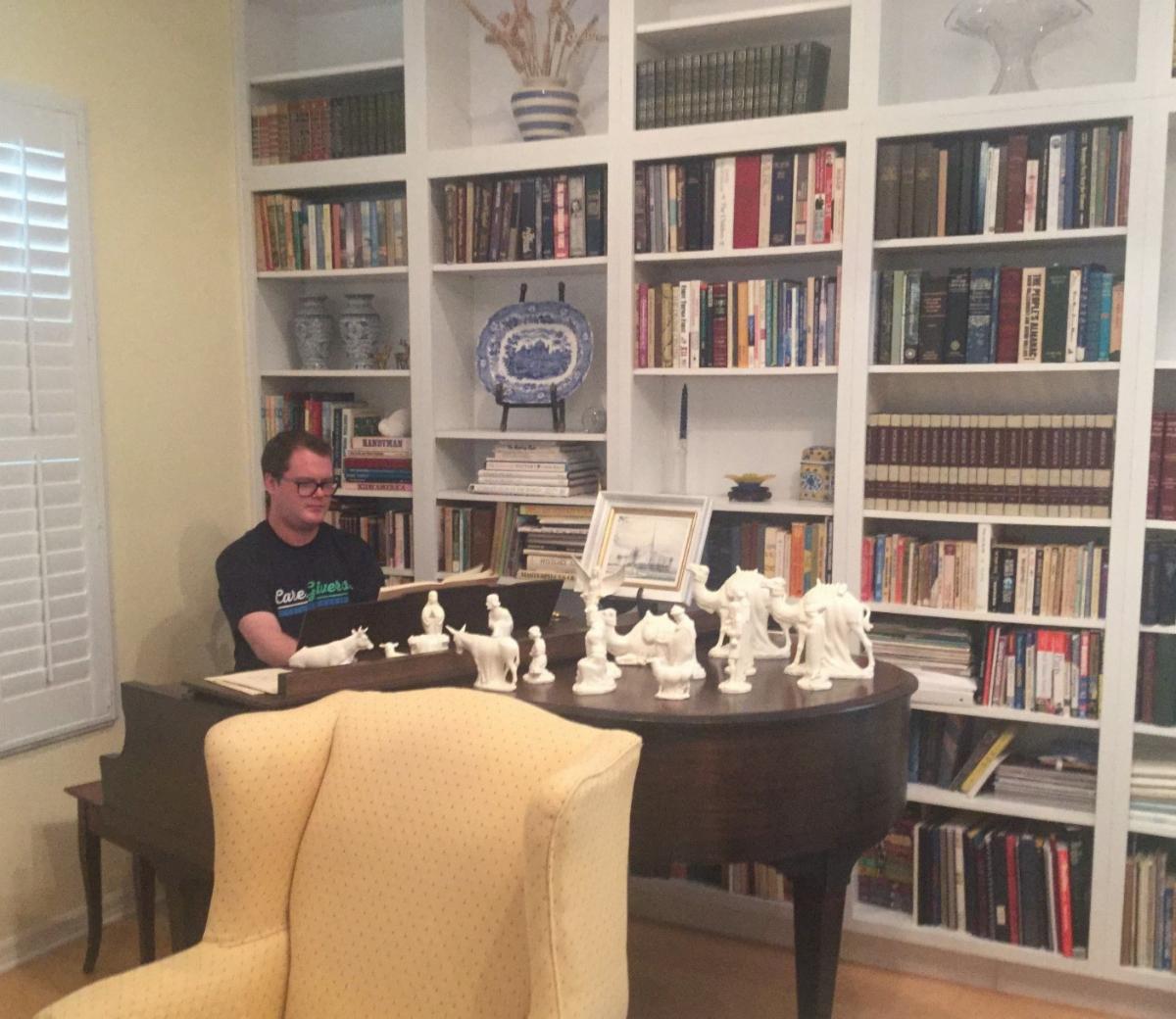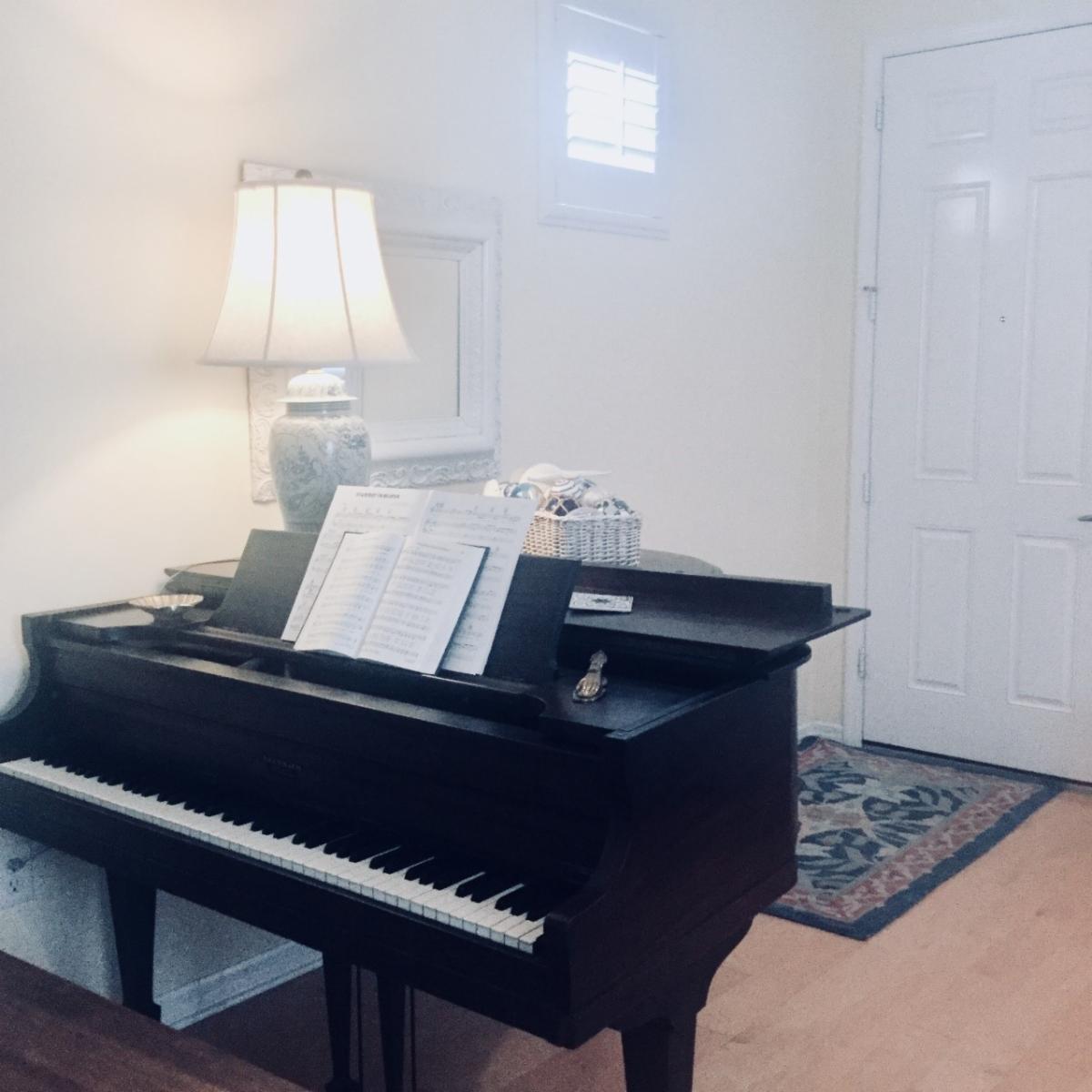FINDING JOY IN AN
OUT-OF-TUNE PIANO
"Virtually every
writer I know would rather be a musician." Kurt Vonnegut

Our son Evan at the family piano, Christmas 2015
As a family, we've encouraged our children to develop their
musical talents. We provided each child piano lessons, membership in their
respective high school bands, and training on violin and guitar for those who
were interested. Some of them have become very accomplished musicians. Many can
sing well and some have become professional piano instructors, guitar teachers,
and church organists.
Our children learned to play the piano on a baby grand piano we
inherited from my wife's grandmother. It's definitely not a Steinway or
anything close to it, but it was adequate for lessons and family sing-alongs.
It's now well over 100 years old and holds generations of loving memories.
Unfortunately, as our children grew up, moved away, and stopped
taking lessons, we tended to neglect the piano's care. It has
suffered through several moves and has gone many years without the benefit of a
good tuning. As a result, this grand old lady is a "little off."

My brother Brent and his family visited us on the Sunday after
Christmas. Brent's five children, all young adults and teenagers, are
exceptionally gifted musicians. The three older daughters have won dozens of
awards in music and have majors or minors in music performance or music
education. The middle son is first chair in his All-State Honors orchestra, and
the younger son, a fine brass player in his own right, is following in his
siblings' footsteps.
As my nieces and nephews were leaving Sunday evening to go back to
their hotel, some of them stopped at the old piano. I apologized for the
mediocre quality of its sound and for its lack of tuning. Kimberly, the oldest
and a college graduate in piano performance, responded with a positive and
cheerful comment:
"Oh, I love to play an out-of-tune piano. You can really get
into . . ." She paused, searching for the right word.
"Ragtime!" said Matthew, "or Honky-Tonk!"
completing her sentence. "It's so fun to play Ragtime or Honky-Tonk on a
piano like this."
Both he and Kimberly jumped on the bench and launched into a
lively Scott Joplin duet, their four hands full of energy and enthusiasm. They
made those old out-of-tune keys sing and dance, filling the room with
happiness.
I was positioned to watch their faces during this impromptu
performance, and in those youthful countenances I saw pure joy.
In their faces I saw the joy of making music; the joy of playing
together; the joy of bringing pleasure to their audience; the joy of using
their well-honed talents; the joy of employing this less-than-perfect
instrument in a manner for which it was perfectly suited.
Never mind that this rather ordinary piano didn't - and probably
never could - measure up to the quality of instruments they were accustomed to
playing in All-State orchestras and college symphonies. What mattered was that
they were making it resonate according to the full measure of its creation.
They overlooked its faults and flaws and indeed used those
weaknesses to their advantage. This piano, at least in its current state, would
not suffice for a senior recital or a grand concerto, but that didn't stop it
from being the belle of the ball at a Sunday evening ragtime gig in the
Farnsworth living room. What fun for all of us!
After they left and I reflected on their visit, it struck me that
my nieces and nephews had just taught me two magnificent life-lessons,
tutorials more about people than about musical instruments.
First, even "average" people can produce exceptional
results when they are placed in the right environment and are nurtured by
leaders, friends, or family who care for them and are willing to overlook their
imperfections. Such supporters recognize abilities and ignore disabilities.
They guide ordinary folks into roles and situations where success is possible,
then believe in them wholeheartedly. Hand in hand, they bring out the best in
everyone. I'm so thankful for leaders, friends, and family who have this
amazing gift and use it to bless and bolster me and others in their circle of
influence.
Second, as frail mortals, each of us can do far more and can become far more when we
allow ourselves to be instruments under God's direction. He can make much more of
us than we could ever achieve alone. One of my favorite poems is "The Touch of the Master's
Hand" by Myra Brooks Welch. I realized after my brother and
his family left that I had just seen a live demonstration of that beautiful
composition.
The Touch of the Master's Hand
'Twas battered and scarred, and the auctioneer
Thought it scarcely worth his while
To waste much time on the old violin,
But held it up with a smile.
"What am I bidden, good folks," he cried,
"Who'll start the bidding for me?"
"A dollar, a dollar. Then two! Only two?
Two dollars, and who'll make it three?"
"Three dollars, once; three dollars, twice;
Going for three..." But no,
From the room, far back, a grey-haired man
Came forward and picked up the bow;
Then wiping the dust from the old violin,
And tightening the loosened strings,
He played a melody pure and sweet,
As a caroling angel sings.
The music ceased, and the auctioneer,
With a voice that was quiet and low,
Said: "What am I bid for the old violin?"
And he held it up with the bow.
"A thousand dollars, and who'll make it two?
Two thousand! And who'll make it three?
Three thousand, once; three thousand, twice,
And going and gone," said he.
Thought it scarcely worth his while
To waste much time on the old violin,
But held it up with a smile.
"What am I bidden, good folks," he cried,
"Who'll start the bidding for me?"
"A dollar, a dollar. Then two! Only two?
Two dollars, and who'll make it three?"
"Three dollars, once; three dollars, twice;
Going for three..." But no,
From the room, far back, a grey-haired man
Came forward and picked up the bow;
Then wiping the dust from the old violin,
And tightening the loosened strings,
He played a melody pure and sweet,
As a caroling angel sings.
The music ceased, and the auctioneer,
With a voice that was quiet and low,
Said: "What am I bid for the old violin?"
And he held it up with the bow.
"A thousand dollars, and who'll make it two?
Two thousand! And who'll make it three?
Three thousand, once; three thousand, twice,
And going and gone," said he.
The people cheered, but some of them cried,
"We do not quite understand.
What changed its worth?" Swift came the reply:
"The touch of the Master's hand."
And many a man with life out of tune,
And battered and scarred with sin,
Is auctioned cheap to the thoughtless crowd
Much like the old violin.
A "mess of pottage," a glass of wine,
A game - and he travels on.
He is "going" once, and "going" twice,
He's "going" and almost "gone."
But the Master comes, and the foolish crowd
Never can quite understand
The worth of a soul and the change that is wrought
By the touch of the Master's hand.
Thank you, Kimberly, Kayla, Karina, Matthew, and Michael, for a
wonderful Christmas message, taught not from a pulpit or lectern but from a
rather ordinary piano bench. And thank you for also teaching me to love and
appreciate our old piano by focusing on its capabilities rather than dwelling
on its disabilities.
And thank you, Brent and Delwyn, for raising such remarkable and
talented children.
No comments:
Post a Comment